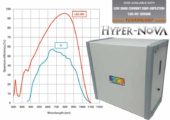Evaluation of the electrochemical anion recognition of-imprinted poly (Azure A) in mixed solutions by ac-electrogravimetry
J Agrisuelas, C Gabrielli, JJ García-Jareño, H Perrot – Electrochimica Acta, 2016
FEB 2016
During the reversible electrochemical reactions of the intrinsically conducting polymer (ICP) films, ions are inserted in them to balance the inner charge site of the polymer. For this reason, doped ICP films with anions or cations can be good candidates for the electrochemical removal of contaminant ions from wastewater. In this work, a polymer of a phenothiazine derivative (poly(Azure A or PAA)) was electrosynthesized by cyclic voltammetry in aqueous solutions using nitrate ions as a structural template. After that, PAA film was repeatedly cycled in identical conditions in a monomer-free solution. The electrochemical anion recognition of the nitrate-imprinted poly(Azure A) was evaluated by the combination of electrochemical and mass impedance spectroscopy, the so called ac-electrogravimetry method. Ac -electrogravimetry allows the selectivity of to be quantified. exhibited a special sensitivity and selectivity for the nitrate ions over the interfering chloride ions in mixed and Cl− containing solutions. The Dixon plots of the kinetic constants obtained by ac -electrogravimetry were used as a graphical method to reveal that and Cl− transfers are non-competitive at lower doped states of the polymer but competitive at higher doped states. The reversibility of nitrate incorporation controlled by an external potential modulation, the relative low cost and easy synthesis render the film suitable in practical implications such as nitrate scavenger in aqueous contaminated environments.





